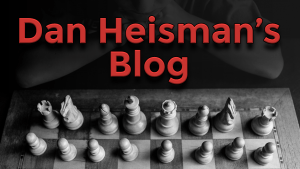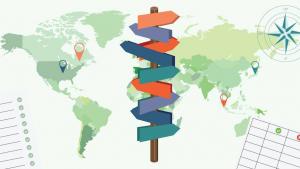Q&A with Coach Heisman Sep 27, 2013
I received several questions asking how I would handle weird openings like 1.d4 d5 2.Be3?! and 1.e4 d5 2.exd5 Qd6?. The number of permutations of possible weird openings, even on the first two moves, is enormous, so no one can be "prepared" for all lines like these. In general, you want to do what you always do: check for tactics for both sides and if there aren't any, get along with efficiently and effectively developing all your pieces. If you want to find out after the game what some good moves are, ask your local engine. Here's what engine Houdini 3 suggested:
1. After 1.d4 d5 2.Be3 it's #1 suggestion is 2...c6 (-0.07) and #2 2...Qd6 (-0.05)
2. After 1.e4 d5 2.exd5 Qd6 #1 is 3.Nc3 (0.95) and #2 is 3.Qf3 (0.64)
If you spend sleepless nights worrying about how to play against lines like these, may I suggest some Sominex, or perhaps a gentler game like tiddlywinks?
I was asked why IBM ("IMB"!) did not show its source code to prove it did not cheat in the 1997 rematch (Game 2, Move Be4). I've written about this several times. I don't think it was asked to show its source code; it was asked to repeat the experiment and see what Deep Blue would play if faced with this situation again. Due to parallel processing and the use of cache, it is possible Deep Blue can play a different move in the same position, even given the same time limit. It's not likely, but if that had happened, imagine the uproar. But I don't think IBM (the Deep Blue team probably did not have the last word...) felt the need to defend themselves to that extent for a variety of reasons.
As I've noted, the inventor of Unix, Ken Thompson, was a consultant at the 2nd Deep Blue match (as was I) and he was tasked to watch the Deep Blue monitor. When he heard there was a controversay, Ken came out and said "Not only did Deep Blue analyze Be4 on the monitor before it played it, Deep Blue has analyzed every move it played thus far in the match before it played it." In other words, one of the world's most respected computer scientists (and one who was not, at that time, to my knowledge, an IBM employee) vouched that the computer was not cheating. I don't think the person who invented Unix was going to risk his reputation to uphold some sort of conspiracy to cheat.
Further, the very next year my PC program Fritz - the one Kasparov used for training - also played Be4 when I fed it the same position as the one Kasparov claimed a computer was unlikely to play! It was not that long thereafter that PC programs were regularly beating all top GMs, so to believe a special purpose hardware computer could do so in 1997, in retrospect, seems quite reasonable. For further reading, I suggest the very interesting Behind Deep Blue by Dr. Hsu, the head of the Deep Blue team.
The show started a little late due to technical difficulties, so while I was waiting for the Q&A channel to "emerge" and produce questions, I showed the first game I ever had published in Chess Life, vs. John Yehl at the 1968 Keystone State Open - over 45 years ago! 
After this round I was 3-0 and I eventually got to 5-0 even though at 1728 I was in the bottom half of this big 1-section open event. I was the only player at 5-0. In the sixth round I lost to Dr. Leroy Dubeck and eventually finished tied for 2nd - not bad for an unknown! 
Someone asked me about White's fourth move in the Marshall Defense 1.d4 d5 2.c4 Nf6?! 3.cxd5 Nxd5. Most beginners play 4.e4 and I was always taught that 4.Nf3 was the most accurate.
After reviewing this variation extensively with computers, I now think that both moves are roughly equally good for White (this entire variation is dubious for Black and that's why you don't see it played among the big boys). However, the lines with 4.e4 can be quite tricky and 4.Nf3 is just clearly good (the idea is to play 5.e4 in many lines without allowing a later ...e5) so I suggest 4.Nf3. For more on this see The Most Common Opening Inaccuracies.
"What percentage of time should you spend studying vs playing?" Glad you asked - I have a rough suggestion at this link on my website.
I am always getting asked questions about books. Tonight I suggested some instructive anthologies and was a viewer suggested I might want to include Karpov's Best Games. The latter is also a game book, but not an instructive anthology (or even an meant-for-instruction non-anthology). If you are not aware of the difference, I strongly recommend you check out Annotated Game Collections vs Instructive Anthologies. My other article that should help you pick out chess books is Chess Books and Prerequisites. Enjoy!
The next show on Oct 11 will be open to all. Think of some interesting questions (or at least questions that will help generate interesting answers!) - your questions drive the show...!



